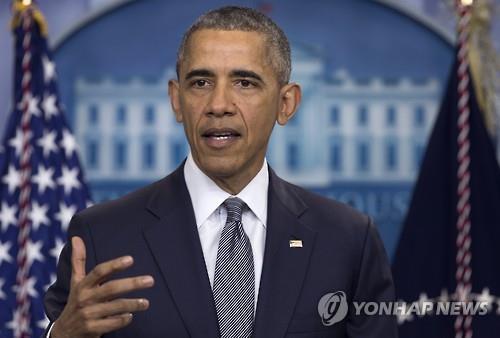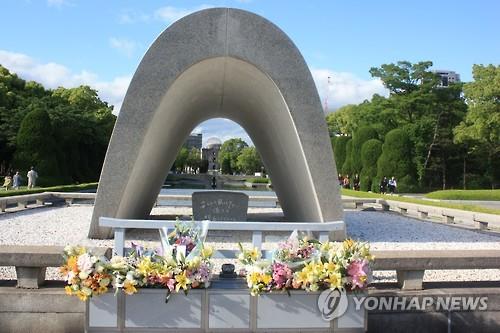- California Assembly OKs highest minimum wage in nation
- S. Korea unveils first graphic cigarette warnings
- US joins with South Korea, Japan in bid to deter North Korea
- LPGA golfer Chun In-gee finally back in action
- S. Korea won’t be top seed in final World Cup qualification round
- US men’s soccer misses 2nd straight Olympics
- US back on track in qualifying with 4-0 win over Guatemala
- High-intensity workout injuries spawn cottage industry
- CDC expands range of Zika mosquitoes into parts of Northeast
- Who knew? ‘The Walking Dead’ is helping families connect
Obama’s visit to Hiroshima stirs concerns in S. Korea and beyond

President Barack Obama speaks during a press conference at the White House in Washington on May 6, 2016, in this photo released by the Associated Press.
SEOUL, (Yonhap) — U.S. President Barack Obama’s plan to visit Hiroshima this month is stirring concerns in South Korea and beyond that it will weaken Tokyo’s sense of contrition for its wartime misdeeds, and aggravate regional historical tensions, analysts said Friday.
In a move to further promote his much-vaunted campaign to pursue a nuclear-free world, Obama will pay a symbolic visit to the once nuclear-bombed city in southwestern Japan on May 27 — a first for a sitting American president.
Since Washington and Tokyo announced Obama’s plan to make the “historic” visit 71 years after the bombing earlier this week, calls have been mounting for him to duly consider the “historical sensitivities” in the region that could be further inflamed by the visit.
Critics highlight that conservatives in Japan might attempt to use Obama’s visit to Hiroshima to achieve its long-cherished goal of shaking off its image as a wartime aggressor and push the humiliating side of its history deeper into the past.
“After all, what (Japanese) Prime Minister Shinzo Abe wants (to achieve from Obama’s visit to Hiroshima) is to move beyond his country’s image as a wartime criminal,” said Nam Chang-hee, an international politics professor at Inha University.
“Conservatives in Japan think that now that more than 70 years have passed by since the end of World War II, it is time to remove the label as a wartime aggressor.”
If the U.S., which ended the war with nuclear bombings of Hiroshima and Nagasaki, helps the island country refurbish its image, Tokyo could more “effectively” address its historical dishonor, Nam added.
At the heart of concerns in South Korea is the possibility that Obama’s visit to Hiroshima could spur historical revisionism among Japanese nationalists — a set of moves to glorify or gloss over its past militarism.
Historical revisionists in Japan argue their country staged the war to fend off Western powers’ invasions of East Asia and should be credited with the endeavors to “liberate” the region. They also say Japan’s wartime atrocities have been exaggerated or falsified.
“Washington might have agonized over whether Obama should visit the city or not, given that even major U.S. media outlets have cautioned against the possibility of his visit emboldening or generally supporting historical revisionism in Japan,” said Park Won-gon, a political science professor at Handong Global University.
The U.S. leader’s controversial visit to Hiroshima was arranged as Washington recognizes the growing strategic need to bolster security cooperation with Japan in the face of an increasingly assertive China.
Japan has been the principal partner in the U.S.’ rebalancing policy toward the Asia-Pacific, an initiative to deepen America’s strategic engagement in the region emerging as a fulcrum of global power and wealth.
Despite such policy interests, Obama faces a tough diplomatic challenge as many worry his visit to Hiroshima is likely to be construed as an apology for the justified nuclear bombings that the U.S. used to end the armed conflict caused by Japan’s imperialist rampage, analysts said.
Some observers particularly underscored that should Obama be seen as paying respect only to Japanese victims in the 1945 bombing, it would cause consternation in South Korea. Tens of thousands of South Koreans, including those forced to work in Hiroshima during Japan’s colonial rule, are thought to have perished in the nuclear bombing.
“The challenge he faces is that in addressing the calamities of nuclear weapons use, any mention in Japan of the Korean victims of the nuclear attack will raise negative sentiments among some elements of Japanese society,” Bruce Bennett, a senior security analyst at the U.S.-based RAND Corp., told Yonhap News Agency via email.
“But on the other hand, to ignore the Korean victims will cause a negative reaction in Korea.”
South Korean victims of the bombing and their supporters have been demanding that Obama pay respect at a special monument dedicated to Korean victims in the Hiroshima Peace Memorial Park when he visits there.
Patrick Cronin, senior director of the Asia-Pacific Security Program at the U.S.-based think tank Center for a New American Security, said that the American president might not want to ignore the wartime past as it is an “indelible” part of history.
“Whatever the precise text of his remarks at Hiroshima, the central message will no doubt reflect on the universal human tragedy of war and the need for the world to work together to avoid Hiroshima-like tragedies in the future,” he told Yonhap News Agency via email.
“President Obama wants the world to confront the past, not to forget it and even less to distort it. Japan’s place in committing acts of brutality and launching a destructive war in Asia are indelible parts of history.”













thomas
May 15, 2016 at 11:35 AM
President Obama’s visit to Hiroshima should serve us all of the devastation of A-Bombs and to remind the world of what nuclear proliferation could bring. President Obama’s visit is not to forgive Japan of its atrocities during the war. And I think the Japanese people realize this.
If we as Korean’s are to become a leader in the world we should not and cannot be so self centered. We MUST learn to forgive but not forget if we are to become a global leader. The feud between Japan should end. We as Korean’s need to take the high road and press forward. For there is absolutely no chance Korea will ever be in that predicament from the past where are our sovereignty is in jeopardy.